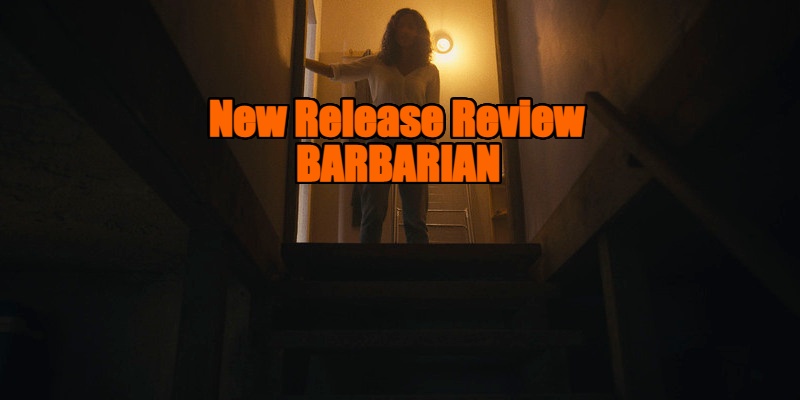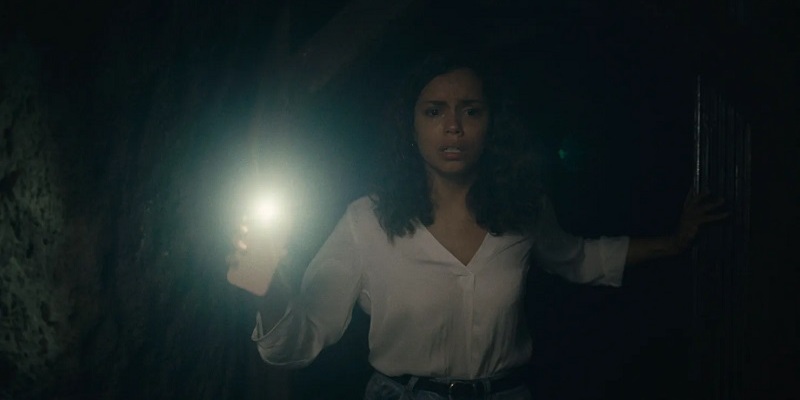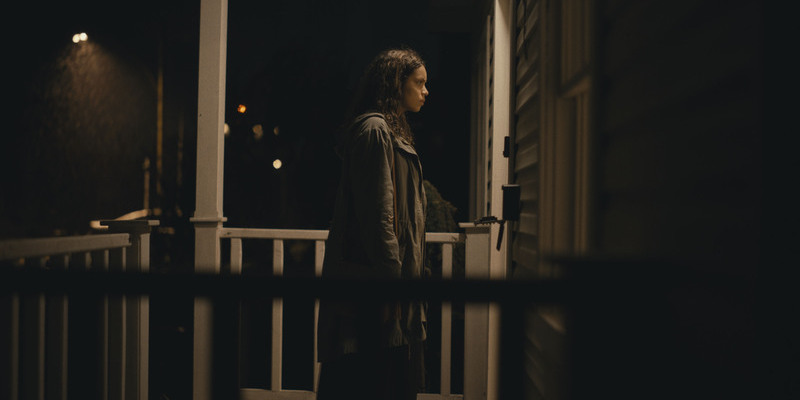
Review by
Eric Hillis
Directed by: Zach Cregger
Starring: Georgina Campbell, Bill Skarsgård, Justin Long,
Matthew Patrick Davis, Richard Brake, Jaymes Butler, Kurt Braunohler

When Hollywood began making horror movies in the 1920s and '30s, Eastern
European villages were reconstructed on American backlots. Today's horror
movies recreate suburban and rural America on Eastern European backlots.
Like
Don't Breathe 2
and the recent reboot of
Texas Chainsaw Massacre, writer/director Zach Creggar's Barbarian is about
how monsters can be formed when America neglects communities for the sake of
progress (an idea that stretches back to Hitchcock's
Psycho). All three films were shot in Eastern Europe, which is incredibly on the
nose given how they take place in parts of America that disintegrated as a
result of America no longer making its own stuff in America. For decades,
Americans were fed stories of how awful it must be to live in Eastern
Europe. Today, Eastern Europeans read horror stories about life in America
and thank the stars they don't live there.
Like the
Don't Breathe
films, Barbarian takes place in Detroit, the city that has
become an emblem for America's post-industrial decline. It looks like it may
have even been shot on the same set. Is there a "Detroit street" set in some
Bulgarian film studio now? Psycho, The Hills Have Eyes, Texas Chainsaw, Don't Breathe and now Barbarian are all about
what happens to the people who hold out when the rest of their community ups
sticks, and it's never good. Away from horror, Clint Eastwood touched on
this with his Detroit-set drama Gran Torino, whose grumpy old holdout could easily have become the sort of monster
seen in the aforementioned movies.
It Follows
used suburban Detroit residents' fear of the inner city to great effect. The
city has become America's Transylvania.

For a long time, it's unclear just who the real monster is in
Barbarian. It takes so many twists that it's become a very different type of horror
movie by its climax than the one it begins as. The type of horror movie it
opens as is another entry in the recent wave of thrillers based around the
world of AirBnB short term rentals (see also
The Rental,
Superhost,
8 Found Dead,
This Teacher
et al). Visiting Detroit for a job interview, Tess (Georgina Campbell) arrives in one of the city's abandoned neighbourhoods where she has
rented a house for the night. She's startled to find the home has been
double-booked, with a nervous young man, Keith (Bill Skarsgard),
woken from his sleep by her arrival.
After some coercing, Tess agrees to take the bed while Keith sleeps on the
couch. The interaction is smartly written and observed by Creggar and played
by Campbell and Skarsgard. Tess's fear is palpable, as is Keith's
awkwardness. Tess is worried this stranger is planning to murder her, while
Keith is worried she might think he plans to murder her. Female viewers will
be screaming for Tess to get the hell out of there, while male viewers will
be doing likewise for Keith. They say a woman's biggest fear is of being
sexually assaulted while a man's biggest fear is of being accused of sexual
assault, and both apprehensions are on display here.

Creggar carries on this idea with the introduction of a flash-forward that
introduces us to the owner of the rental property. AJ (Justin Long)
is a TV star who receives the news that an actress he recently worked with
has accused him of rape. AJ denies the charge, but a drunken conversation
with one of his bros suggests otherwise. Desperate for cash, AJ heads to
Detroit to prepare his property for sale, and finds a surprise awaiting
him.
It's difficult to elaborate on Barbarian's premise, given how many twists and surprises it springs on the audience.
But unlike many thrillers, it isn't solely reliant on plot twists. Creggar
uses his surprises to keep us on our toes rather than to simply provoke
cattleprod reactions. The flashes back and forth in time have the effect of
adding to the suspense, giving us new information that clues us into how
messed up things really are and just what level of danger the characters
have gotten themselves into. Psycho proves a large influence,
not just in how the narrative is set in motion by a woman staying the night
with a nervous young man she feels is too virginal to prove a real threat,
but in how it introduces a second protagonist out of the blue. And of
course, there's the theme of the last building standing in an otherwise
decimated landscape. It's crazy how Hitchcock's film continually reinvents
itself as a metaphor for whatever malaise America is currently
experiencing.

As a director, Creggar seems more influenced by John Carpenter than
Hitchcock, particularly in his use of the widescreen frame and his
recognition of the importance of geography in creating fear. Like Carpenter,
Creggar's filmmaking is never flashy and its deceptive simplicity masks an
ingenious understanding of what creeps us out. There's a bravura sequence in
which someone wedges a chair against a door leading into a dark hallway. As
the character walks down the hallway, Creggar keeps the light of the open
door visible in the background. This rectangle of safety grows smaller and
smaller as the character moves further down the hallway, racking up tension
second by second. Most filmmakers would focus on the threat the character is
walking towards, but Creggar instead keeps us aware of the safety they're
leaving behind.Creggar does something similar with the street the action takes place on,
introducing us to it in darkness. In the middle of the night it comes off as
a regular creepy street, but in broad daylight it's even more disturbing
when we're confronted with a scene of urban desolation.
Things get a bit silly in the climax, but then things got a little silly in
Psycho's climax too. We don't remember Anthony Perkins in his mother's outfit
rushing at Vera Miles with a knife, we remember his attack on her
predecessor. Barbarian similarly does its most memorable work
in its first half, but even if you struggle to follow it into the grindhouse
territory it navigates in its back half, you have to admit you're watching
the work of a potentially very special filmmaker.


